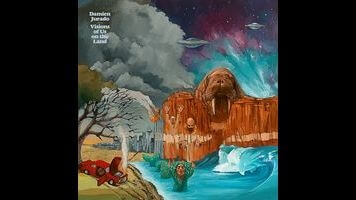Damien Jurado keeps to the wide-open road on Visions Of Us On The Land

Now 12 full-length studio albums in, Damien Jurado has always seemed dutiful rather than prolific. The Seattle singer-songwriter, who began his career in the mid-’90s after being discovered by Sub Pop, has released records at basically a two-year clip. And while much of his early work with Secretly Canadian—the label he moved to in the mid-’00s—flaunts the ambiance of a dude alone on stage with nothing more than a wooden stool, a microphone, and an acoustic guitar, his last handful of albums are off-kilter exploratory crusades. More mysterious drifter than pensive tea-house regular.
Jurado’s sidestep can at least somewhat be credited to producer and labelmate Richard Swift, who has been collaborating with the songwriter since 2010’s Saint Bartlett, a noted departure from its indie-folk predecessor Caught In The Trees. Together with Swift, a multi-instrumentalist who also plays with the Shins and now the Arcs, Jurado has cultivated a harrowing sound that makes his oft-restrained croak sound prophetic—even as his lyrics so often deal with directionless-ness and mortality. His new double album, Visions Of Us On The Land, is prismatic in scope as it moves from a sweeping wanderer-like track filled with tribal rhythms and swirling reverb (“Mellow Blue Polka Dot”) to one with a soulful saunter—particularly in Jurado’s vocals—that’s split in half by a blown-out psych riff (“Lon Bella”).
No doubt that Visions is a crowning representation of Jurado’s grand ambition, epitomized by the fact that it’s the final chapter of a trilogy that also includes 2012’s Maraqopa and 2014’s Brothers And Sisters Of The Eternal Son. But though the collab with Swift has resulted in easily Jurado’s most fascinating records as a songwriter, the wide-open road might be a little too inviting at times—because occasionally you need to consult a map for fear of driving off the end of the Earth.
You love the meandering on a song like “Onalaska,” which features hovering instrumentation that pairs sympathetically with the lyrics “I had been in the desert and spent time on a mountain / Off of my feet and floating in suspension,” and the uplifting group chorus and gospel-like bent on “Exit 353.” But Jurado’s earnestness gets a tad heavy as nearing the end of the 17-track album, and you sometimes can’t help but pray that he’s either approaching his final destination—because there can’t possibly be another horizon, can there?—or he’s about to run out of gas. Thankfully, over his 20-plus-year arc, Jurado has never really given much indication that the latter is even possible.